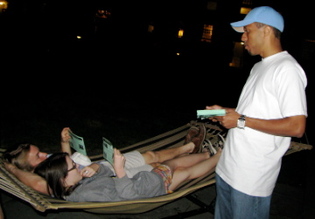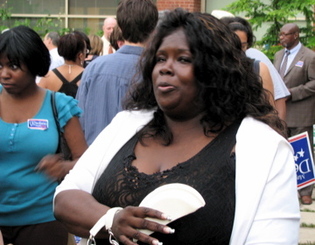
 With the Yalies back in town, Dixwell’s aldermanic race has moved into university courtyards.
With the Yalies back in town, Dixwell’s aldermanic race has moved into university courtyards.
Both leading candidates in Ward 22’s Democratic aldermanic primary race, incumbent Greg Morehead and challenger Lisa Hopkins, drummed up votes in the same courtyard this week, at Yale’s Silliman College.
“How’s it going?” asked Morehead, striking up a conversation with two students who were cuddling in a courtyard hammock around 9 p.m. Tuesday.
“Are there any stars out?” he asked. From their supine position, the students accepted a campaign flyer and a plea to switch their voter registration to New Haven. Morehead, a three-year incumbent, faces Hopkins and fellow Democrat Cordelia Thorpe in the Sept. 15 primary. They’re all running against each other for the third time.
As Morehead made his pitch Tuesday, a third student climbed into the hammock and lay horizontally on top of the pair. The candidate didn’t miss a beat: “What’s the weight limit on this?” he joked.
It was an unusual setting for a political battle that has historically been waged on far different terrain. Ward 22 was traditionally contained mostly in the Dixwell neighborhood in the heart of the city’s African-American community. Campaigns were won or lost on the doorsteps of places like the former Elm Haven projects and the elderly housing tower on Bristol Street.
Now, as a visit along the campaign trail this week demonstrated, the game has changed.
A New Landscape
The change comes from a recent surge of involvement from young Yale Democrats, combined with new political boundaries that shift power toward Yalies.
Ward 22 is one of 30 political fiefdoms in the city, each comprised of about 4,000 people. Each elects its own representative to the Board of Aldermen. Political lines are redrawn every 10 years, following the U.S. Census.
Yale students’ influence in the ward has grown significantly over the last seven years. Prior to 2002, Yale had a marginal presence in Ward 22: only two of Yale’s undergraduate 12 residential colleges, Morse and Stiles, lay inside the ward boundaries. When it came time to redraw the lines in 2002, Dixwell had suffered a large population drain because Elm Haven was razed to make way for the new, less-dense Monterey Homes. Ward 22 was redrawn to incorporate a larger swath of Yale encompassing four residential colleges (Morse, Stiles, Timothy Dwight and Silliman) and a new Swing Space dorm on Tower Parkway. Two graduate student dorms also lie in Ward 22.
Yale dorm-dwellers now comprise nearly 20 percent of the ward’s primary voting base — a total of 256 out of 1,359 registered Democrats in Ward 22 live in Yale campus housing, according to the voting registrar’s latest tally. That’s not counting the hundreds more students who are registered as unaffiliated voters or in their home towns. Out-of-staters and unaffiliated voters have until Sept. 10 to switch their registrations to become New Haven Democrats. If they do, Yale’s influence will further swell.
Adding to Yale’s influence has been a concentrated effort by politicians to enlist energetic, politically engaged students who can tap into large groups of potential voters concentrated in dorms. The rest of the ward, the Dixwell portion, has historically had low voter turnout.
Inside Helpers
So Morehead and Hopkins could both be found in the courtyard of Silliman College Tuesday night.
They couldn’t get there alone. Morehead and Hopkins live on the same street in Dixwell. They don’t have Yale keycards. Their potential Yale student voters live in virtual castles, protected by iron gates and deep, empty moats.
This year, both Hopkins and Morehead have gained support from Yale undergraduates, who lend them access to campus and help get out the campus vote.
 Campaign volunteers greeted Hopkins and her teenage daughter Heaven in the courtyard around 7 p.m. Sochie Nnaemeka (at right in photo, with Hopkins at center and Ellen Degnan at left), a Yale senior who took time off to work for the Obama campaign, ran the show. She and Hopkins met at a leadership program run by the Connecticut Center for a New Economy. Nnaemeka gave three female volunteers a pep talk on how to talk to voters.
Campaign volunteers greeted Hopkins and her teenage daughter Heaven in the courtyard around 7 p.m. Sochie Nnaemeka (at right in photo, with Hopkins at center and Ellen Degnan at left), a Yale senior who took time off to work for the Obama campaign, ran the show. She and Hopkins met at a leadership program run by the Connecticut Center for a New Economy. Nnaemeka gave three female volunteers a pep talk on how to talk to voters.
In Dixwell, Nnaemeka said, Hopkins’ message focuses on transparency in government, and giving disenfranchised, low-income voters a stronger voice in City Hall. At Yale, she said, the message is a bit different: Stress the need for a “stronger link” between Yale and Dixwell, as well as a common issue between the two candidates— safer streets.
Hopkins knocked on doors with Degnan, who lives in the dorm. She made her pitch in general terms, vowing to “bridge the gap” between students and Dixwell. With two new residential colleges rising in Dixwell, that bond will be even more important, she argued.
“A lot of our issues and concerns are the same,” Hopkins said, listing public safety and transparency in government. Her campaign literature echoes those general goals, with vows to address issues surrounding public safety, youth, affordable housing and seniors.
Get On The Bus
Morehead took a more concrete, conversational approach. He led with specifics: “Are you familiar with Bolt Bus?”
He was referring to a sister company of Greyhound.
“Fares start at one to 25 dollars,” Morehead said.
His campaign flier offers more details: “Bolt has $1 fares to Boston, New York, Philadelphia and D.C. and it has free Wifi!”
Morehead told students he’s “authoring legislation to put a Bolt bus stop in New Haven,” so they can enjoy the cheap fares, too. He’s referring to a bill he’ll propose at Tuesday’s Board of Aldermen meeting (click here to read it).
The bill won’t be binding in any way. It “strongly encourages the leadership at Bolt Bus” to expand service to New Haven. The alderman’s gesture builds on a citywide movement urging the company to come to town. With that call amplified, he argued, Bolt will be more likely to come.
In brief conversations with students, Morehead added a little star power to his campaign pitch: He dropped the name Ludacris, whom he drums for. The candidate’s flyer features Morehead wearing a backwards hat, posing with the rapper. He mentions how he brought Ludacris to town to talk to “at-risk youth” as well as Yale students. Like Hopkins, he also stressed being a conduit between Dixwell and Yale, and working toward safer streets.
In their travels, both candidates hit a hurdle: Out-of-state students often don’t want to change their registrations to vote in New Haven. If they want to keep their registrations at home, they can switch back after the primary, explained Morehead’s escort, a Yale junior named Audrey Huntington.
“That seems like way too much hassle,” one student replied.
Locked Out
The third candidate in the aldermanic race, Cordelia Thorpe, said she hasn’t made it onto Yale’s campus yet to campaign. She said she’s still looking for a student who will invite her inside the dorms.
 “As it stands now, I am not allowed to go on campus,” she said. “It’s a barrier. I don’t have a key to a gate.”
“As it stands now, I am not allowed to go on campus,” she said. “It’s a barrier. I don’t have a key to a gate.”
Thorpe said when she was young, ward politics were all about her neighborhood. In recent years, Yale students have skewed the election, she said.
“They’re controlling who wins the vote,” said Thorpe, who’s making her third run for alderwoman.
The landscape will likely change again when the city redraws political boundaries in 2012 — largely to account for the repopulation of the Monterey Homes. Some consideration may also be made for the two new residential colleges Yale plans to build near Dixwell, which are slated for completion as soon as 2015.
Thorpe suggested that when the city draws the new map, Yale should get its own ward.
Concerns about the Yale vote in Dixwell surfaced in the 2007, when the same trio of candidates faced off in a special election and a primary.
At that time, Hopkins and Thorpe both complained about being barred from campus. Morehead, who was backed by New Haven’s Democratic Town Committee, gained access to a nominating meeting of the Yale College Democrats, and snagged its endorsement, too.
Thorpe argued the process was rigged against candidates who didn’t have the DTC’s help.
Yale students “were the cause of my defeat,” Thorpe said, “in all of the elections I’ve been in.” She said students “didn’t try to get to know me. They were just programmed to vote a certain way, and they did.”
“Most people who go to Yale have a good potential to being the president of the United States,” and they should take the time to inform themselves about the candidates, Thorpe argued.
When Morehead won his first election, Democratic Town Committee (DTC) Chairwoman Susie Voigt acknowledged that the Yale vote gave Morehead a boost.
“If Greg had an advantage, it’s because of the endorsement of the Yale Dems,” she told the Independent when he won the April 2007 special election. “He sought them out and they endorsed him. Every Yale student who came here was transported by car.”
Morehead continued to rely on Yale support in his reelection primary race a few months later, in September 2007. While Yale was a big factor, it was not the deciding factor, he argued: He counted that Yale votes only comprised 49 of the 204 votes he won on the machines.
With so few people voting in the ward, those Yale votes could be enough to change the race: In Sept. 2007, Morehead won 247 votes. Hopkins got 114 and Thorpe earned 33.
The Yale College Democrats no longer make endorsements before primaries. Students in the group are volunteering for both Morehead and Hopkins. Morehead has the New Haven DTC endorsement. Ben Shaffer, the Mayor John DeStefano’s deputy campaign manager, has also been volunteering for Morehead’s campaign.
This year, Hopkins said she’s learned the game. She garnered Yalie support early on, before the students even came back to campus. Tuesday she brought along her daughter, Heather, and a young man from Dixwell to help her knock doors at Silliman. With the help of four campus escorts, they reached many potential voters.
Campaigning on campus proved unpredictable at times.
At the end of one corridor, Morehead stumbled across one student who had left the door wide open while she dressed. The woman closed the door, threw on some clothes, then came into the hall. She shrugged off the awkward situation.
“It’s OK,” she said. “It’s like seeing me in a bathing suit. What do you need?”